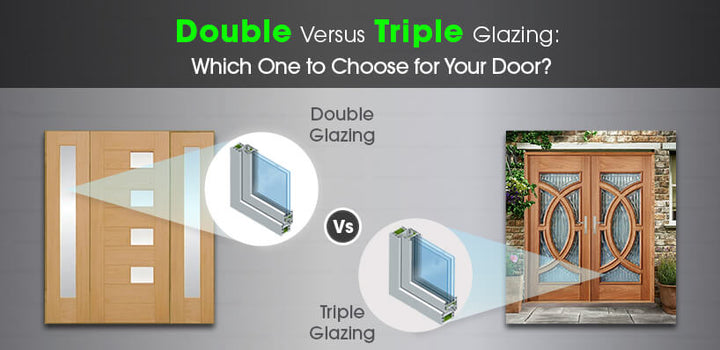
Double vs Triple Glazing Doors: Which One to Choose?
The task of replacing a door itself is a huge brain-bender since it’s the first step of introducing your house and carries a huge burden of an impression.
But besides just the look, replacing a door can be not only an effective solution but also trendsetting. If you have considered changing your doors, you must have definitely come across double and triple glazing modern external doors options. If yes, it tough to decide whether to choose double or triple glazing doors. Each has its own benefits, and they can be fairly weighed. Let's take a look.
Double and Triple Glazing
In simple words, double glazing refers to doors or windows with two layers of glass with a space between them. It is also known as ‘insulated glazing’.
Alternatively, triple glazing refers to three panes of glass separated by argon gas as opposed to two panes in double glazing. However, the concept of double and triple glazing is more complicated than the simple differentiation in the number of glass panes.
The argon gas is present between the three glass panes in triple glazing, as opposed to two panes in double glazing is an insulating gas. It has garnered popularity in cold climate countries and nowadays is also increasing in demand in many areas of the UK.
Triple Glazing Doors
Triple glazed doors have an extra pane of glass, so each tripled glazed sealed unit is thicker and heavier when compared to double glazing. This adds an extra strain on the windows and door hinges. Triple glazing stores higher amount of argon gas than double glazing to maximize energy efficiency and reduce sound for your home. Therefore, we will try to understand whether the additional benefits of triple glazing is worth a fairly higher cost than the double glazing.
Double and Triple Glazing Doors Facts
The mutual features of double and triple glazed doors are:
- Lower energy bills/ energy optimization
- Adds value to your home
- Helps to minimize condensation
- Beefs up your security, and
- Reduces noise, leading to less disturbance because of sound
Therefore, we can’t determine the better option for you, but we will outline significant differences to help you make an informed decision to whether or not invest in glazed doors.
Double vs Triple Glazing Doors: Key Differences
-
Energy Efficiency
On a scale of ‘A+ to E’, leading manufacturers rate triple-glazed doors an A+ and a double- glazed door at an A. This means triple glazing gives 40% more thermal efficiency than double glazing, which means energy saving is augmented with the installation of triple glazed doors. However, triple glazing sealed units do tend to break down more often than double glazing sealed units, and both the options offer high insulation and sometimes the difference in thermal efficiency between them is only marginal.
-
Noise Prevention
Double glazed doors offer massive noise reduction when compared to single glazed doors. Similarly, triple glazed doors offer improved noise reduction than double glazed doors. This might not justify the expense involved in the installation of a triple glazed door, but it is highly helpful if your side in a particularly noisy area, or if you are frequently battered by gale force winds.
-
Security
Theoretically, a three-glass door is harder to break than a two-glass door due to the presence of a toughened glass in between two glasses. Practically, on the other hand, it is still possible to break the glass. Hence, if security is an alarming concern for you, you should look for less transparent options than glass doors.
-
U- Value
U- Value or thermal transmittance measures how well the glass retains heat. The higher the value, the more the heat escapes. 1.6 and 0.8 are the U- Values of double and triple glazing respectively, while single glazing has a high U-Value of 5 units. Triple glazing also reduces the warming effect of sunshine compared to double glazing. But the extra strain exerted on the frames, hinges and opening window and door sashes is a valid point to consider in case of triple glazing.
-
Price
Triple glazing is 40% more expensive than double glazing at the minimum, and the replacement of triple- glazed doors is equally higher. They also cost more at the outset.
-
Condensation
Condensation occurs when there is a drastic difference in temperatures, as can be seen in most cold countries. If your home is prone to condensation, triple glazing is a better option owing to its higher U-Value when compared to double glazing. It not only reduces the likelihood of condensation but also protects your house from future damage to window frames, paint etc., that would have been caused due to condensation.
To Switch to Triple Glazing or Not?
There is a notable number of pros and cons of both double and triple glazed doors. There's an indefinite talk at the moment about triple glazing being the ‘must- have’ addition to your home, but we shall not decide for you.